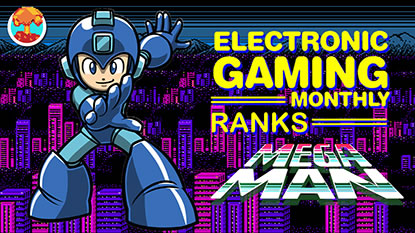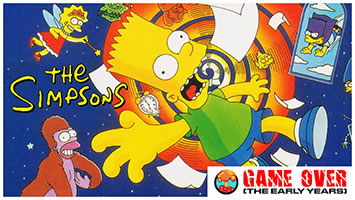- CLASSIC MAGAZINES
- REVIEW CREW
A show recapping what critics thought back
when classic games first came out! - NEXT GENERATION'S BEST & WORST
From the worst 1-star reviews to the best
5-stars can offer, this is Next Generation! - NINTENDO POWER (ARCHIVE)
Experience a variety of shows looking at the
often baffling history of Nintendo Power! - MAGAZINE RETROSPECTIVE
We're looking at the absolutely true history of
some of the most iconic game magazines ever! - SUPER PLAY'S TOP 600
The longest and most ambitious Super NES
countdown on the internet! - THEY SAID WHAT?
Debunking predictions and gossip found
in classic video game magazines! - NEXT GENERATION UNCOVERED
Cyril is back in this spin-off series, featuring the
cover critic review the art of Next Generation! - HARDCORE GAMER MAGAZING (PDF ISSUES)
Download all 36 issues of Hardcore Gamer
Magazine and relive the fun in PDF form!
- REVIEW CREW
- ELECTRONIC GAMING MONTHLY
- ELECTRONIC GAMING MONTHLY RANKS
From Mario to Sonic to Street Fighter, EGM
ranks classic game franchises and consoles! - ELECTRONIC GAMING MONTHLY BEST & WORST
Counting down EGM’s best and worst reviews
going year by year, from 1989 – 2009! - ELECTRONIC GAMING BEST & WORST AWARDS
11-part video series chronicling the ups and
downs of EGM’s Best & Worst Awards!
- ELECTRONIC GAMING MONTHLY RANKS
- GAME HISTORY
- GAME OVER: STORY BREAKDOWNS
Long-running series breaking down game
stories and analyzing their endings! - A BRIEF HISTORY OF GAMING w/ [NAME HERE]
Real history presented in a fun and pithy
format from a variety of game historians! - THE BLACK SHEEP
A series looking back at the black sheep
entries in popular game franchises! - INSTANT EXPERT
Everything you could possibly want to know
about a wide variety of gaming topics! - FREEZE FRAME
When something familiar happens in the games
industry, we're there to take a picture! - I'VE GOT YOUR NUMBER
Learn real video game history through a series
of number-themed episodes, starting at zero! - GREAT MOMENTS IN BAD ACTING
A joyous celebration of some of gaming's
absolute worst voice acting!
- GAME OVER: STORY BREAKDOWNS
- POPULAR SHOWS
- DG NEWS w/ LORNE RISELEY
Newsman Lorne Riseley hosts a regular
series looking at the hottest gaming news! - REVIEW REWIND
Cyril replays a game he reviewed 10+ years
ago to see if he got it right or wrong! - ON-RUNNING FEUDS
Defunct Games' longest-running show, with
editorials, observations and other fun oddities! - DEFUNCT GAMES QUIZ (ARCHIVE)
From online quizzes to game shows, we're
putting your video game knowledge to the test!- QUIZ: ONLINE PASS
Take a weekly quiz to see how well you know
the news and current gaming events! - QUIZ: KNOW THE GAME
One-on-one quiz show where contestants
find out if they actually know classic games! - QUIZ: THE LEADERBOARD
Can you guess the game based on the classic
review? Find out with The Leaderboard!
- QUIZ: ONLINE PASS
- DEFUNCT GAMES VS.
Cyril and the Defunct Games staff isn't afraid
to choose their favorite games and more! - CYRIL READS WORLDS OF POWER
Defunct Games recreates classic game
novelizations through the audio book format!
- DG NEWS w/ LORNE RISELEY
- COMEDY
- GAME EXPECTANCY
How long will your favorite hero live? We crunch
the numbers in this series about dying! - VIDEO GAME ADVICE
Famous game characters answer real personal
advice questions with a humorous slant! - FAKE GAMES: GUERILLA SCRAPBOOK
A long-running series about fake games and
the people who love them (covers included)! - WORST GAME EVER
A contest that attempts to create the worst
video game ever made, complete with covers! - LEVEL 1 STORIES
Literature based on the first stages of some
of your favorite classic video games! - THE COVER CRITIC
One of Defunct Games' earliest shows, Cover
Critic digs up some of the worst box art ever! - COMMERCIAL BREAK
Take a trip through some of the best and
worst video game advertisements of all time! - COMIC BOOK MODS
You've never seen comics like this before.
A curious mix of rewritten video game comics!
- GAME EXPECTANCY
- SERIES ARCHIVE
- NINTENDO SWITCH ONLINE ARCHIVE
A regularly-updated list of every Nintendo
Switch Online release, plus links to review! - PLAYSTATION PLUS CLASSIC ARCHIVE
A comprehensive list of every PlayStation
Plus classic release, including links! - RETRO-BIT PUBLISHING ARCHIVE
A regularly-updated list of every Retro-Bit
game released! - REVIEW MARATHONS w/ ADAM WALLACE
Join critic Adam Wallace as he takes us on a
classic review marathon with different themes!- DEFUNCT GAMES GOLF CLUB
Adam Wallace takes to the links to slice his way
through 72 classic golf game reviews! - 007 IN PIXELS
Adam Wallace takes on the world's greatest spy
as he reviews 15 weeks of James Bond games! - A SALUTE TO VAMPIRES
Adam Wallace is sinking his teeth into a series
covering Castlevania, BloodRayne and more! - CAPCOM'S CURSE
Adam Wallace is celebrating 13 days of Halloween
with a line-up of Capcom's scariest games! - THE FALL OF SUPERMAN
Adam Wallace is a man of steel for playing
some of the absolute worst Superman games! - THE 31 GAMES OF HALLOWEEN
Adam Wallace spends every day of October afraid
as he reviews some of the scariest games ever! - 12 WEEKS OF STAR TREK
Adam Wallace boldly goes where no critic has
gone before in this Star Trek marathon!
- DEFUNCT GAMES GOLF CLUB
- DAYS OF CHRISTMAS (ARCHIVE)
Annual holiday series with themed-episodes
that date all the way back to 2001!- 2015: 30 Ridiculous Retro Rumors
- 2014: 29 Magazines of Christmas
- 2013: 29 Questionable Power-Ups of Christmas
- 2012: 34 Theme Songs of Christmas
- 2011: 32 Game Endings of Christmas
- 2010: 31 Bonus Levels of Christmas
- 2009: 30 Genres of Christmas
- 2008: 29 Controls of Christmas
- 2007: 34 Cliches of Christmas
- 2006: 33 Consoles of Christmas
- 2005: 32 Articles of Christmas
- 2004: 31 Websites of Christmas
- 2003: 29 Issues of Christmas
- 2002: 28 Years of Christmas
- 2001: 33 Days of Christmas
- NINTENDO SWITCH ONLINE ARCHIVE
- REVIEW ARCHIVE
- FULL ARCHIVE
In Defense of the Epic Adventure Game
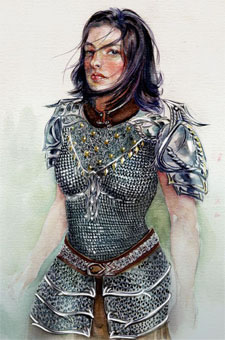
In case you haven't noticed, the women of The Elder Scrolls IV: Oblivion are not an attractive lot!
But with all these adventure games coming out there is a renewed interest in knocking down some of the best-loved story telling formulas. Are the critics right when they contest that most adventure games feature the same narrative and are almost always an epic tale where you are the only person that can save humanity? Critics will always find something
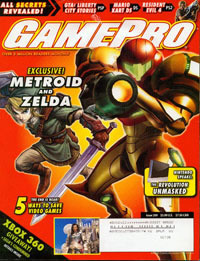
Leave it to GamePro to promote their exclusives of the new Zelda and Metroid DS ... a year after they were officially announced!
This argument was giving legs recently when GamePro magazine ran a story on the Five Ways to Save Video Games. There it was, a popular video game magazine bringing up an argument that has been alive and well on message boards for years now. Are these adventure games -- Final Fantasy, Dragon Quest, Suidoken, etc. -- too epic? Is the idea that you're the only person on the planet that can
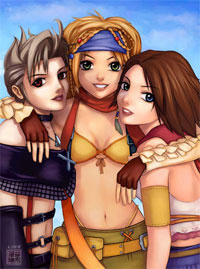
On second thought, Final Fantasy X-2 might have been better if it was just about the little things!
"It's high time designers stop revolving around the thoughtless drivel that sees A) the player as the hero; B) the hero taking on impossible odds to defeat some oppressive enemy force; and C) the hero saving the world -- and perhaps even existence itself -- by beaning enough baddies in the head with his magical sniper rifle." That is how GamePro summarizes it, continuing, "This is
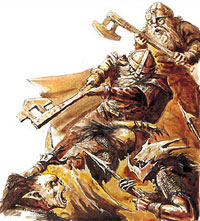
If The Lord of the Rings wasn't ultimately about defeating evil, why would you invest 10 hours of your life watching it?
GamePro may have a point that some video game makers could scale down the game's overly dramatic story lines, but what GamePro (and all critics of this style of story telling) is forgetting is that there are perfectly good reasons for this epic formula to exist. It's easy to suggest that we should have games focus on smaller scale situations, but in practice that's nearly impossible to do with this type of game.
Adventure games are, by and large, a struggle between good and evil. They are stories of people going against the odds
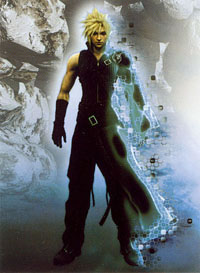
I don't mind the hyperbole in Final Fantasy, but I could do without the metrosexual men!
Games like Final Fantasy and Dragon Quest are no different from movies like The Lord of the Rings or Gladiator. This is story telling that allows you to give your hero a mission; give him reasons to train and go through all of the perils that come with this mission. It also allows you to create a bad guy, a character that can be as simple or complex as the storyteller wants.
For video game developers it's easy to see why they would want to make these epic games, it's the type of story that people connect to and is easy to drag out for dozens of hours. Surely these stories aren't required to be so dramatic (putting everybody's life in danger), but you've spent the money to go on a quest that could take you more than 50 hours; game
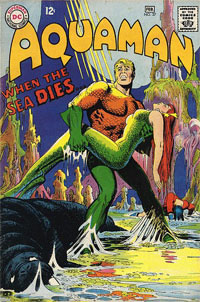
C'mon Mr. Cameron, I know you want to make that Aquaman movie for real!
Think of these games like you would a comic book movie. Be it Superman, Batman or even Dare Devil, all superhero movies involve the good guy defeating some evil madman who intends to kill a large cross section of people. And if Aquaman isn't your thing, then what about James Bond? People go to 007 movies to watch their favorite British spy kill an evil genius who plans on getting his way ... even if he has to kill a bunch of people in the
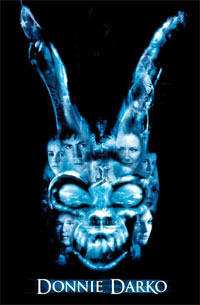
If GamePro doesn't like stories about men who save humanity, then they must HATE Donnie Darko!
And it's not just traditional adventure games, its titles like Halo as well. GamePro complains that "only Master Chief can save the planet," but forgets to note that it wouldn't be as much fun to just be the guy in the background watching somebody else save the world. Sure we can work together as a team, but we're talking about an over-the-top science fiction story, why wouldn't you want to be the person that single handedly saves the world? Not only is that exciting, but it's something that is easy to get behind. Convincing somebody that they're going to be three rows back watching somebody else do all the cool stuff might be a hard sell.
GamePro asks, "How cool would it be if the hero died halfway through the game, and the player carried on as the villain?" This is not a bad idea, but two games that GamePro singled out had similar story shifts. Final
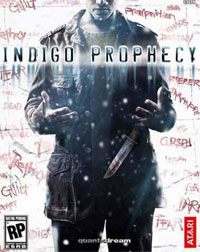
The Indigo Prophecy, yet another game GamePro clearly didn't play!
GamePro continues, "Or what if it slowly became evident -- slowly -- that the player himself was the villain, whether on purpose or by accident?" Haven't these people played Call of Cthulhu: The Dark Corners of the Earth? Or what about the fantastic adventure game, Indigo Prophecy?
The idea of playing with the convention is great, but it's already being done. There are plenty of games currently on the market that showcase unique twists on the "Good vs.
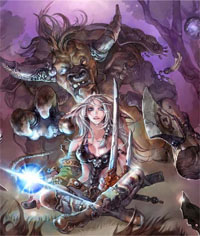
World of WarCraft is fun, but its lack of ending can get real annoying!
Lost in this argument are all of the massively multi-player online role playing games currently populating the software aisles at Best Buy. Games like World of WarCraft and Final Fantasy XI are polar opposites of the games we have been talking about. Instead of the story revolving around you, these MMO's really stress that you're just one person in a world that is bigger than
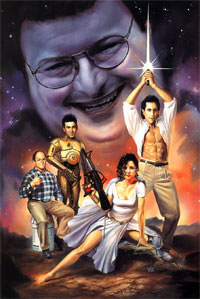
It's Seinfeld: The Game - a game that is literally about nothing!
These countless MMO's have their place, but from a strictly story telling standpoint they are far from satisfying. The reason that Final Fantasy VII stands out in people's minds is because it managed to weave a fascinating story with memorable characters. Your adventure to save the world is one of the most endearing things about the game, especially when you look at how each character grows on their quest. The fact that the story has a beginning, middle and end is not something I consider to be a negative, I actually like the feeling I have when I've defeated the last boss and have finally saved my friends, family and everybody else on the planet.
There are a lot of games that fit into this formula that are garbage; by now we all know that not every game is worth playing. But when it's done right this epic storyline is effective and fun. In the end GamePro suggests the most extreme idea yet, "What if there were no heroes and no villains, just ordinary people doing the best they could under supremely tough circumstances?" I guess if that's the type of adventure GamePro wants to go on then I won't complain, but we already have that game ... it's called The Sims!
HOME |
CONTACT |
NOW HIRING |
WHAT IS DEFUNCT GAMES? |
NINTENDO SWITCH ONLINE |
RETRO-BIT PUBLISHING
Retro-Bit |
Switch Planet |
The Halcyon Show |
Same Name, Different Game |
Dragnix |
Press the Buttons
Game Zone Online | Hardcore Gamer | The Dreamcast Junkyard | Video Game Blogger
Dr Strife | Games For Lunch | Mondo Cool Cast | Boxed Pixels | Sega CD Universe | Gaming Trend
Game Zone Online | Hardcore Gamer | The Dreamcast Junkyard | Video Game Blogger
Dr Strife | Games For Lunch | Mondo Cool Cast | Boxed Pixels | Sega CD Universe | Gaming Trend
Copyright © 2001-2025 Defunct Games
All rights reserved. All trademarks are properties of their respective owners.
All rights reserved. All trademarks are properties of their respective owners.













